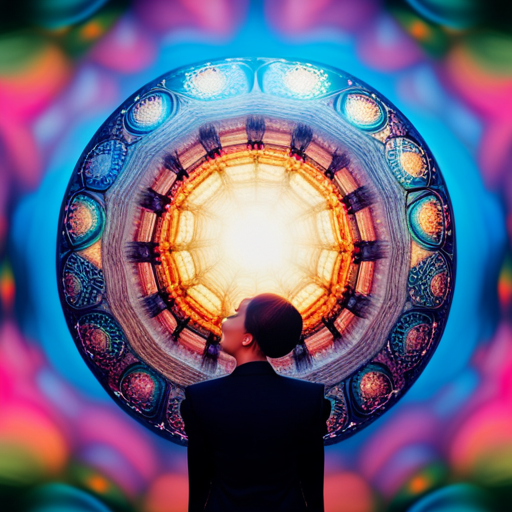Have you ever experienced a dream that felt so real, so vivid, that it stayed with you long after you woke up? I’m sure many of us have, and it’s a fascinating phenomenon that has intrigued scientists and dream enthusiasts alike for centuries.
In exploring the question of why we sometimes have vivid dreams, we delve into the intricate workings of our subconscious minds. Drawing upon the science of dreams, we uncover the role of REM sleep, the impact of stress and anxiety, and the influence of sleep disorders. Additionally, we consider the effects of medications and substance use on dream vividness, as well as the fascinating realm of lucid dreaming.
We’ll also touch on the significance of emotional processing in dreams and how keeping a dream journal can aid in interpretation. So, let’s embark on this journey of understanding and discover why our dreams occasionally transport us to a world that feels as real as our waking life.
Key Takeaways
- Vivid dreams are a result of the brain’s highly active state during REM sleep.
- Factors such as stress, anxiety, and emotional disturbances can contribute to more frequent and intense dreams.
- Sleep disorders, medications, and substance use can affect dream recall and vividness.
- Dream analysis and recall, as well as techniques like lucid dreaming and dream journaling, can provide insights into thoughts, emotions, and experiences during dreams.
The Science of Dreams
Why do you sometimes have vivid dreams? It’s because your brain is like a movie projector, creating detailed and lifelike scenes while you sleep.
Dream analysis reveals that dreams are a window into our subconscious mind, where our deepest desires, fears, and emotions reside. During sleep, our brain processes and organizes information from the day, and this includes our thoughts and experiences. As a result, our dreams can be a reflection of our subconscious mind, portraying hidden desires or unresolved conflicts.
The role of REM (rapid eye movement) sleep is crucial in understanding the vividness of dreams. REM sleep is a stage of sleep where our brain becomes highly active, and our eyes move rapidly. This is the stage where dreams are most likely to occur, and it is believed to be when the brain consolidates memories and stimulates creativity.
During REM sleep, our brain releases neurotransmitters that suppress our voluntary muscle movements, ensuring that we don’t physically act out our dreams.
Understanding the science behind vivid dreams and the role of REM sleep provides insight into the complexity of our sleep cycle and the importance of dreaming in our lives.
The Role of REM Sleep
During REM sleep, my imagination goes into overdrive, creating dreams so vivid they could rival a Hollywood blockbuster. REM stands for Rapid Eye Movement, which is a stage of sleep characterized by, as the name suggests, rapid eye movements.
It is during this stage that dreams occur. The brain is highly active during REM sleep, with neural activity resembling that of wakefulness. This heightened activity is believed to be responsible for the vivid and immersive nature of dreams during this stage.
During REM sleep, the brain’s visual and emotional centers are particularly active. This explains why dreams often involve vivid imagery and intense emotions. The brain is essentially creating a virtual reality experience while we sleep. It is fascinating to think that our brain has the ability to generate such detailed and complex scenarios without any external stimuli.
The transition from REM sleep to the subsequent section about the impact of stress and anxiety is seamless. Dreams can be influenced by our emotions and experiences, which is why stress and anxiety can have a significant impact on dream content. Understanding this connection can provide valuable insights into the relationship between our mental state and our dreams.
Impact of Stress and Anxiety
The impact of stress and anxiety on our sleep is profound, as our restless minds create a chaotic symphony of emotions that infiltrate our dreams. It is well-known that stress and anxiety can lead to more frequent and intense dreams, often resulting in vivid dream experiences. Additionally, our diet and exercise habits can also play a role in dream vividness.
Research suggests that certain foods can affect the content and intensity of our dreams. For example, consuming spicy or fatty foods close to bedtime may increase the likelihood of experiencing nightmares or vivid dreams. On the other hand, a diet rich in fruits and vegetables has been associated with more positive dream experiences.
Exercise can also impact the vividness of our dreams. Engaging in regular physical activity has been shown to improve sleep quality and reduce stress and anxiety levels. As a result, individuals who exercise regularly may experience more peaceful and less intense dreams.
Incorporating a 2 column and 5 row table:
| Factors Affecting Dream Vividness |
|---|
| Stress and Anxiety |
| Diet |
| Exercise |
| Sleep Disorders |
| Medications |
The relationship between stress, anxiety, diet, exercise, and dream vividness is complex and multifaceted. Understanding these factors can help individuals manage their sleep and dream experiences more effectively. Moving forward, we will explore the influence of sleep disorders on dream vividness.
The Influence of Sleep Disorders
Sleep disorders can drastically impact the intensity and emotional depth of our dreams, leaving us feeling restless and overwhelmed. One of the key ways in which sleep disorders affect our dreams is through their impact on dream recall. Sleep disorders such as insomnia can disrupt the sleep cycle, leading to fragmented and disrupted sleep. This can make it more difficult for us to remember our dreams upon waking.
Additionally, sleep disorders can also lead to more frequent awakenings during the night, which can interrupt the dreaming process and make it harder for us to have deep, vivid dreams.
Another way in which sleep disorders can influence our dreams is through the disruption of REM (rapid eye movement) sleep. REM sleep is the stage of sleep during which most dreaming occurs. However, certain sleep disorders, such as sleep apnea, can cause interruptions in REM sleep, resulting in less time spent in this stage and potentially less vivid dreaming.
Sleep disorders can have a significant impact on the intensity and emotional depth of our dreams. By disrupting the sleep cycle, affecting dream recall, and interrupting REM sleep, these disorders can leave us feeling restless and overwhelmed.
Transitioning into the next section, it’s important to consider how medications and substance use may further influence our dream experiences.
Medications and Substance Use
Imagine yourself under the influence of medications or substances, as they transport you into a dreamlike state filled with distorted landscapes and surreal experiences. It’s not uncommon for certain medications to have an impact on the intensity and vividness of our dreams.
Additionally, our diet plays a significant role in the occurrence of vivid dreams. Certain foods, such as spicy dishes or those high in sugar, can increase brain activity during sleep, leading to more intense dreams.
Recreational drug use is another factor that can significantly influence dream intensity. Substances like marijuana and hallucinogens like LSD or psilocybin mushrooms are known to enhance dream vividness and alter the content of dreams. These drugs can affect the neurotransmitters in the brain, leading to more vivid and often bizarre dream experiences.
Transitioning to the next section on psychological factors, it’s important to note that while medications and substance use can contribute to vivid dreams, they’re not the only factors at play. Psychological factors, such as stress, anxiety, and emotional disturbances, also have a significant impact on the content and intensity of our dreams. Understanding these various factors can help us better comprehend the complex nature of our dream experiences.
Psychological Factors
Transport yourself to a world where your emotions swirl like a whirlwind, your fears and anxieties taking shape in the form of vivid, haunting dreams. The mind is a fascinating realm, and dreams are windows into our subconscious. When it comes to understanding why we sometimes have vivid dreams, dream analysis and dream recall play crucial roles.
Dream analysis involves examining the symbolism and themes present in our dreams to gain insights into our thoughts, emotions, and experiences. By deciphering the hidden messages in our dreams, we can better understand ourselves and potentially uncover unresolved issues or conflicts in our waking lives.
Dream recall, on the other hand, refers to our ability to remember our dreams upon waking. Some people naturally have better dream recall than others, and various factors can influence this ability. For instance, stress, sleep quality, and even certain medications can affect dream recall.
Table: Factors Affecting Dream Recall
| Factors | Explanation |
|---|---|
| Stress | High levels of stress can hinder dream recall. |
| Sleep Quality | Better sleep quality often leads to improved recall. |
| Medications | Certain medications can affect dream recall. |
Understanding the psychological factors that contribute to vivid dreams is just one piece of the puzzle. In the subsequent section on emotional processing, we will explore how these dreams can aid in the processing and understanding of our emotions.
Emotional Processing
Explore the depths of your mind as it processes and unravels the emotions embedded within your vivid dream experiences. Emotional processing plays a significant role in the intensity and clarity of our dreams. Dreams are often influenced by our emotions, and they provide a platform for us to process and understand our feelings on a subconscious level.
Dream symbolism is a crucial aspect of emotional processing in dreams. Symbolic representations of our emotions and experiences are manifested in our dreams, allowing us to explore and make sense of them in a unique way. These symbols can be deeply personal and may not always be immediately apparent, requiring some reflection and interpretation to understand their meaning.
Additionally, dream recall is essential for emotional processing in dreams. The ability to remember and retain the details of our dreams allows for deeper analysis and reflection on the emotions experienced during the dream. By recalling and reflecting on our dreams, we can gain insight into our emotional state, unresolved issues, and even potential solutions.
As we delve into the realm of lucid dreaming, we can further unlock the potential for emotional processing within our dreams. Lucid dreaming, the state of being aware that one is dreaming while still in the dream, grants us the ability to actively engage with and manipulate our emotions within the dream world.
Lucid Dreaming
Lucid dreaming, with its power to transform the dreamer into an active participant, allows us to confront our deepest fears and experience intense joy in a single breath. By becoming aware that we are dreaming within the dream, we can take control and shape the narrative according to our desires. Lucid dreaming techniques, such as reality checks and keeping a dream journal, can help increase the frequency of lucid dreams.
Benefits of lucid dreaming are abundant. Not only can we explore fantastical worlds and engage in impossible adventures, but we can also use lucid dreaming as a tool for personal growth and self-discovery. Through lucid dreaming, we can practice new skills, enhance creativity, and even overcome phobias and anxieties by confronting them in a safe dream environment.
To illustrate the potential of lucid dreaming, let’s look at a dream scenario and its interpretation:
| Dream Scenario | Interpretation | Action |
|---|---|---|
| Being chased by a monster | Fear of confrontation | Face fears head-on |
Dream journaling and interpretation allow us to delve deeper into the meaning behind our dreams and gain insights into our subconscious mind. It provides a bridge between the dream world and our waking reality, enabling us to better understand ourselves and our emotions. Moving forward, let’s explore the significance of dream journaling and interpretation.
Dream Journaling and Interpretation
Capture the vivid details of your dreams in a journal and unlock the hidden meanings behind them through interpretation. Dream journaling is a powerful tool that allows us to delve into the realm of our dreams and gain insight into our subconscious mind.
By recording our dreams immediately upon waking, we can preserve the intricate details and emotions that would otherwise fade away. Dream symbolism plays a significant role in understanding the messages our dreams convey. Through journaling, patterns and recurring symbols can be identified, giving us a deeper understanding of our own psyche.
Additionally, dream journaling can aid in the practice of lucid dreaming. Lucid dreaming is the ability to become aware that you are dreaming while still in the dream state. By keeping a dream journal, you can identify common dream signs, such as unusual occurrences or recurring themes, which can serve as triggers for becoming lucid. This awareness allows you to actively participate and manipulate the dream, leading to more vivid and memorable experiences.
Transitioning into the subsequent section about ‘tips for promoting vivid dreams,’ it’s important to recognize that dream journaling and interpretation are just the beginning steps towards unlocking the full potential of our dream world.
Tips for Promoting Vivid Dreams
Enhance your dream experiences by incorporating these tips to create a more vivid dream world. Improving recall is key to having vivid dreams.
Keeping a dream journal beside your bed and writing down your dreams as soon as you wake up can help improve your ability to remember them. By regularly recording your dreams, you’re training your brain to pay more attention to your dreams, making them more vivid and memorable.
Another way to promote vivid dreams is by incorporating dream supplements into your routine. Certain supplements, such as vitamin B6, melatonin, and valerian root, have been reported to enhance dream recall and intensity. However, it’s important to consult with a healthcare professional before starting any new supplements to ensure they’re safe for you.
Lastly, creating a peaceful and relaxing sleep environment can contribute to more vivid dreams. Avoiding stimulating activities before bed, such as using electronic devices or consuming caffeine, can help your mind and body relax, leading to more vivid and immersive dream experiences.
Incorporating these tips into your routine can help promote more vivid dreams and enhance your overall dream experiences.
Frequently Asked Questions
Can vivid dreams be a sign of a serious medical condition?
Vivid dreams can sometimes be a sign of a serious medical condition, although it isn’t always the case. For instance, a study conducted on patients with post-traumatic stress disorder found that those who experienced vivid dreams were more likely to have severe psychological symptoms.
Additionally, certain medications, such as antidepressants and antipsychotics, have been known to cause vivid dreams as a side effect. It’s important to consult with a healthcare professional to understand the underlying causes and potential psychological implications of vivid dreams.
Is there a way to control the content of our vivid dreams?
Lucid dreaming, the ability to control the content of our dreams, can be achieved through various techniques. One method is dream journaling, where you record your dreams immediately upon waking. This helps increase dream recall and awareness, making it easier to recognize when you’re dreaming.
With practice and patience, you can develop the ability to consciously manipulate the dream narrative, allowing you to explore and experience whatever you desire within the vivid world of your dreams.
Can external factors, such as noise or temperature, affect the intensity of vivid dreams?
External factors such as noise or temperature can indeed affect the intensity of vivid dreams. Stress, for example, can contribute to the vividness of our dreams. When we’re stressed, our brain tends to be more active during sleep, leading to more vivid and intense dreams.
Additionally, certain medications, such as antidepressants or sleep aids, can also impact the intensity of dreams. It’s important to be mindful of these external factors as they can influence the content and emotional experience of our dreams.
Are people who experience vivid dreams more creative or imaginative?
People who experience vivid dreams may indeed be more creative and imaginative. Studies have shown a positive correlation between vivid dreams and problem-solving abilities, suggesting that the heightened visualization and imaginative processes during dreaming can contribute to creative thinking.
Additionally, vivid dreams have been linked to emotional processing, as dreams often reflect and process our emotions. This connection between emotional processing and creativity further supports the idea that those who have vivid dreams may be more creative and imaginative.
Can vivid dreams be induced or enhanced through certain techniques or practices?
Lucid dreaming techniques, such as reality checks and mnemonic induction, can induce or enhance vivid dreams. According to a study conducted by the University of Adelaide, individuals who practiced lucid dreaming techniques experienced a significant increase in the frequency and vividness of their dreams.
Additionally, keeping a dream journal can further enhance dream recall and vividness. By recording and reflecting on dreams regularly, one can develop a better understanding of their dream patterns and potentially increase the likelihood of having vivid dreams.
Conclusion
In conclusion, understanding the reasons behind vivid dreams can provide us with valuable insights into our subconscious minds.
The science of dreams reveals the role of REM sleep in creating these immersive experiences, while stress and anxiety can heighten their intensity.
Sleep disorders and medications can also influence the vividness of our dreams. However, it’s important to remember that dreams serve a purpose in our emotional processing and can even lead to lucid dreaming.
By keeping a dream journal and exploring their interpretations, we can delve deeper into our own psyche.
So, embrace the mystery of your dreams and let them guide you on your journey of self-discovery.









